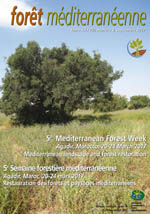
- Année : 2017
- Auteur(s) : PARFONDRY M., AMONGERO C., BERRAHMOUNI N.
- Référence : T. XXXVIII, n°3, 2017, pp. 273-278.
- Mots-clés : BASES DE DONNEES, COOPERATION INTERNATIONALE, GESTION DURABLE, GOUVERNANCE, BASSIN MEDITERRANEEN
Article en accès libre et téléchargement gratuit
Résumé
Restoration and rehabilitation efforts have been undertaken for decades in the Mediterranean region and with different degrees of success. Nevertheless, they all offer valuable lessons onto which other initiatives can be built, thus improving their success. As part of its effort to compile and analyze data and share lessons learnt on restoration, the Food and Agriculture Organization of the United Nations (FAO) has been collecting data on Mediterranean restoration and rehabilitation, including reforestation and afforestation, projects, programmes and initiatives. Based on an online consultation and desk research, a preliminary mapping allowed to compile and analyze data from a total of 40 restoration and rehabilitation initiatives in 13 Mediterranean countries. These initiatives were analyzed in terms of their objective, scale, type of stakeholders involved, type of land degradation and main measures taken, and sources of funding. The results highlighted some key issues, which were then translated into recommendations to support restoration practitioners and decision-makers. These recommendations focus on the choice of the best restoration strategy, the choice of the most appropriate (native) species and genetic material, as well as some key elements to ensure the long-term sustainability of these initiatives.
Téléchargement de l'article
Spécial numéro international "5e Semaine forestière méditerranéenne - Agadir" - T. XXXVIII, n°3, 2017
S'abonner, adhérer, nous soutenir
Je m'abonne pour recevoir les publications de l'association, j’adhère à l’association
en payant ma cotisation et je soutiens l’association en faisant un don.
